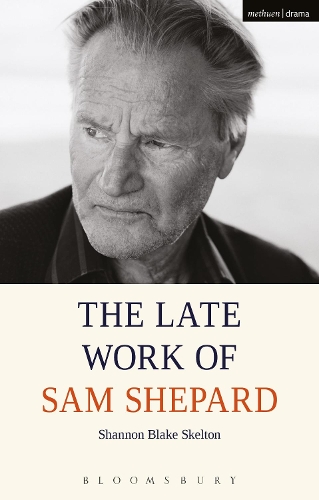
The Late Work of Sam Shepard
(Paperback)
Available Formats
Publishing Details
The Late Work of Sam Shepard
By (Author) Shannon Blake Skelton
Bloomsbury Publishing PLC
Methuen Drama
19th October 2017
United Kingdom
Classifications
Tertiary Education
Non Fiction
Literary studies: c 1900 to c 2000
812.54
Physical Properties
Paperback
272
Width 138mm, Height 216mm, Spine 22mm
360g
Description
Hailed by critics during the 1980s as the decades 'Great American Playwright', Sam Shepard continued to produce work in a wide array of media including short prose, films, plays, performances and screenplays until his death in 2017. Like Samuel Beckett and Tennessee Williams in their autumnal years, Shepard relentlessly pressed the potentialities and possibilities of theatre. This is the first volume to consider Shepard's later work and career in detail and ranges across his work produced since the late 1980s. Shepard's motion picture directorial debut Far North (1988) served as the beginning of a new cycle of work. He returned to the stage with the politically engaged States of Shock (1991) which resembled neither his earlier plays nor his family cycle. With both Far North and States of Shock, Shepard signaled a transition into a phase in which he would experiment in form, subject and media for the next two decades. Skelton's comprehensive study includes consideration of his work in films such as Hamlet (2000), Black Hawk Down (2001), The Assassination of Jesse James by the Coward Robert Ford (2007) and Brothers (2009); issues of authenticity in the film and screenplay Dont Come Knocking (2005) and the play Kicking a Dead Horse (2007); of memory and trauma in Simpatico, The Late Henry Moss and When the World was Green, and of masculine and conservative narratives in States of Shock and The God of Hell. Lauded by critics in his lifetime and since his death in July 2017 as 'one of the most important and influential writers of his generation' (NY Times), Shepard 'excelled as an actor, screenwriter, playwright and director' (Guardian); this is a timely and important assessment of his work spanning the last three decades of his life.
Reviews
The best chapter charts all the echoes of Shepard's biography, media persona and actual writings in the variety of film and television roles he has played since his Oscar-nominated turn as Chuck Yeager in The Right Stuff ... [Skelton] is also good on Shepard's cultural status. * Times Literary Supplement *
Shannon Skelton has produced an excellent, insightful, and unique study of the later plays of Sam Shepard. This is an intelligent book, one that is essential for anyone interested in Sam Shepard and the contemporary stage. -- Matthew Roudan, Georgia State University, USA
Skelton's The Late Work of Sam Shepard addresses a lacuna in Shepard scholarship. Most of the critical attention given to Shepard's work centers on his early productions, and the playwright's waning popularity has certainly contributed to this lack of attention. Skelton (Kansas State Univ.) examines nine works written since 1988, looking at how Shepard's later style reveals, as she writes in the introduction, "a maturing of the Shepard persona" and a willingness to explore "different media, subjects, and aesthetics and ... to pose solutions to dilemmas previously considered yet never resolved. Skelton examines both the intertextual and the transmedial (a mode of storytelling that transcends one medium and develops on various platforms) qualities of these works. A key feature of the later works is the ability of characters to resolve issues and concerns raised in earlier works: as an example, Skelton compares The Late Henry Moss (2002) with True West (1980), looking at how the later work solves the issues of personal conflict left unresolved in the earlier play. Offering a range of critical approaches and exhibiting scholarly sophistication, this is an intelligent, overdue contribution to the literature on Shepard. Summing Up: Recommended. Upper-division undergraduates through faculty. * CHOICE *
Author Bio
Shannon Blake Skelton teaches at Kansas State University, USA.
